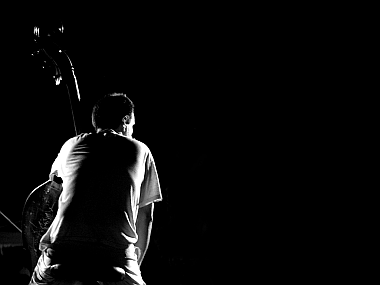But Mingus had a kind of wisdom in his approach to life and to music that is, I think, of great value in today’s innovation-based culture. He was deeply committed to the art of improvisation, even developing his own music notation system for his compositions so that musicians wouldn’t be limited to playing a specific note for a specific length of time; instead, Mingus’ compositions make suggestions about what approximate note to play and for about how many beats they should play it. We’re called on to improvise all the time. We might sit down and try to brainstorm the solution to a problem, use a tool to do a job it wasn’t intended for, or suddenly be asked to speak to a large group — when these things happen, we have to either improvise, often making things up as we go along, or accept failure. Assuming the second option is unacceptable, here are a few lessons I’ve picked up from Mingus about thinking fast on your feet:
Go with the flow: Mingus describes the perfect experience in music-making as that moment when everything comes together just right and the right notes, the right phrase, the right everything just comes. Writers, musicians, artists, and others know this state of flow is hard to get to, but when it happens, everything just works. When you’re improvising, don’t second-guess yourself, don’t obsess over doing the right thing, and don’t worry about what comes next, don’t do anything that gets in the way of the flow. There’ll be time enough to sort out the mistakes when you have solid ground under your feet again. You don’t play alone: Too many people think about the great Jazz geniuses as exemplars of individualism: free minds striving for greatness. Here’s what Mingus would do when a soloist thought too highly of his own genius — he’d direct the band to stop playing, leaving the soloist hanging without any backup, looking like a fool. Improvisation is as much about the relationships between people as it is about our own self-expression; work with the input of those around you instead of trying to stand out against it. Learn the rules so you can break them: It’s hard to explain what the difference between someone who doesn’t know the rules and someone who knows them and breaks them is — but we know it when we hear (or see) it. Mingus learned to play in the highly structured environment of a classical ensemble; later, he studied the big band compositions of Duke Ellington. There’s nothing sloppy or naive about his compositions, even when they break all the rules — Mingus knew the rules well enough to know why they had to be broken. Play by ear: Mingus’ classical career came to an end when it was discovered that he wasn’t reading the music but was playing what he felt worked best. If you find yourself playing without sheet music, or according to charts you don’t know how to read, follow your gut instinct and do what “sounds” right. Embrace limits: There can be no creativity without limits. Sounds strange, but limits are the cause and reason of creativity. Consider this: you are standing on a perfectly smooth surface wearing perfectly smooth shoes. No limits, right? Except you can’t move…Infinite choice is paralyzing; limits give us something to work with — or against — so we can at least get started. Use common structures in creative ways: Some of the best Jazz is based on popular music (e.g. Coltrane’s “Favorite Things”), folk tunes, and blues songs. These common structures give musicians an “anchor” that imposes limits to work against (see above) but also gives them a set of stock material to throw in when they run out of ideas and need to figure out what to do next. If you ever get a chance to witness a real jam session, you’ll hear snatches of dozens of popular songs that musicians rely on to express certain ideas, give themselves time to think, and even get a laugh. Don’t be afraid to throw in a cliche or borrow someone else’s phrase when you’re improvising — you might breathe new life into it and find yourself changing it into something else entirely. When you make a mistake, keep playing: It’s not the mistakes that matter, it’s what you make out of them. It may well turn out that your “mistake” takes you in a whole new — and better — direction.
The essence of improvisation is to churn out ideas and see what sticks. This means that as often as not, you’re going to end up with some real garbage. Mingus, and every other musician, had terrible nights, when nothing came off well — that’s the risk you take when you put yourself on the edge. The payoff is well worth it, though — when everything comes together just right, you can end up with greatness.
